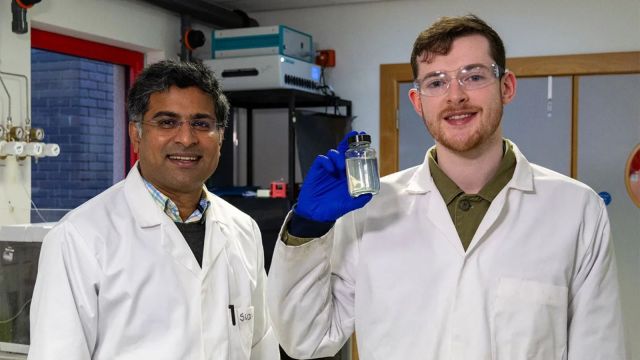Scientists create green sustainable fuel from whisky distilling waste
Scientists have used the wastewater from a whisky distillery to create green hydrogen, a sustainable fuel.
 Sudhagar Pitchaimuthu (left) and PhD student Michael Walsh with a sample of whisky distillery wastewater. (Heriot-Watt University)
Sudhagar Pitchaimuthu (left) and PhD student Michael Walsh with a sample of whisky distillery wastewater. (Heriot-Watt University)This really should not be taken for an excuse to drink more but researchers at the Heriot-Watt University in Edinburgh used wastewater from the whisky distilling industry to produce green hydrogen, which is a type of sustainable fuel.
They did this by developing a new nanoscale material — a particle is about one-10,000thd the diameter of a human hair. This allowed distillery wastewater to replace fresh water in the green hydrogen production process. This nanoparticle is called nickel selenide and it treats the wastewater. This produced similar or slightly higher quantities of green hydrogen compared to fresh water, according to the university.
“It takes 9kg of water to produce every 1kg of green hydrogen. Meanwhile, every 1 litre of malt whisky production creates about 10 litres of residue. To help protect the planet, we need to reduce our use of fresh water and other natural resources. So our research focused on how to use this distillery wastewater for green hydrogen production with a simple process that removes waste materials present in the water,” said Sudhagar Pitchaimuthu, co-author of a paper published in the journal Sustainable Energy & Fuels, in a press statement.
Unlike fossil fuels, hydrogen does not emit carbon when it burns. Green hydrogen refers to the fuel generated using renewable energy. Green hydrogen is typically produced using electrolysis using electricity from renewable sources like wind or solar. This process produces hydrogen by splitting water molecules into hydrogen and oxygen.
Usually, devices that perform electrolysis or electrolysers only work with fresh water. The added substances in wastewater usually makes them fail. But the researchers claim they were able to overcome this with the use of the nanoparticle.
The research team is now working on developing their own electrolyser prototype and scaling up production of the nickel selenide nanoparticles. The team will also analyse the distillery wastewater to discover whether something of value can be salvaged from it during the purification process.







